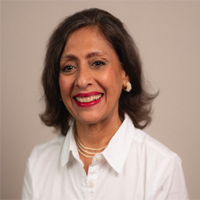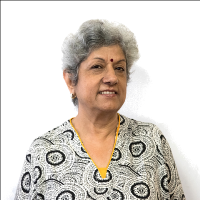Founders’ message
On March 11, 2020, Gateway House completed 10 years of its mission: to engage India’s leading corporations, financial institutions and individuals in debate and scholarship on India’s foreign policy and expand the nation’s role in global affairs.
In order to achieve this ambitious goal building institutional and intellectual capacity in India, we decided against taking government or foreign agency funding. We wanted to integrate the expertise of business into our research to develop a pragmatic foreign policy for India. Hence, we set ourselves up as independent, non-partisan, membership-based, not-for-profit. Most importantly, we are the only foreign policy think tank in the world started by two women. Over the past decade, we have seen a greater consciousness of the important contributions that women make to business and policy-making. But progress in their involvement has been patchy. At the same time, there have been enough believers to encourage us to persist.
With a small amount of individual and corporate funding, we set up Gateway House in a donor’s parking lot – like start-ups all over the world, except we were building an intellectual institution.
We quietly began breaking into uncharted territory. Foreign policy used to be regarded as the preserve of government, and new business thinking was the domain of business schools and chambers of commerce. The concept of a “think tank” was a novelty outside New Delhi and the male-dominated field was confined to an established few players. India needed new policies, and independent institutions where ideas could be thought through, debated, and put out for public and government consumption. People questioned locating Gateway House in Mumbai, a city of commerce rather than politics. But, we pressed on, joined by young scholars, all passionately invested in the merit of the mission, and gender balance.
The result, 10 years on, is an institution that is regarded globally as one of the leading think tanks in India especially for its research in geoeconomics, global financial governance, energy, climate change, space, terrorism, non-conventional security including data and cyber, legal and regulatory research, to name a few. Our pioneering visual research on the new connectivity projects, both physical and virtual, has garnered global interest. We are also the only think tank to have a history fellow – we treasure the international linkages of our city which are chronicled extensively, starting from 1670.
Early blue-sky research won us the attention of the international scholarly community for ‘provocative analysis’ and of our own government which then assigned us studies on India’s multilateral ambitions. Mumbai’s business community has embraced the scholarship of Gateway House through active participation and encouragement. This is exactly our goal: to raise India’s thought leadership in such debates at home and abroad.
The quality of our work is attested to by the position we attain repeatedly in several categories of the prestigious annual University of Pennsylvania global think tank rankings. That includes our vibrant presence in the virtual world of social media. We are regularly invited to participate in conferences and seminars by think tanks and governments around the world.
This is all done while adhering to our s.80g commitment to being not-for-profit and eschewing foreign funding to build a truly independent Indian think tank.
By empowering ourselves, we have shattered two stereotypes through the decade: that only men do business, and that only men can think strategically. We have opened the field of Indian think tank engagement to generations of new, young Indian scholars, including and especially empowering women scholars.
India too, has shattered stereotypes of a developing country, through its achievements in space, digital, information technology, pharma, and as a democratic force for stability and security in the region. Our country is increasingly stepping up and out into the world and taking on new responsibilities. We are now at an exciting point, where India will, at 75 years, be the chair of the world’s most influential economic forum, today – the G20.
It is a once-in decades chance for India to lead the writing of global rules, rather than be the passive rule-taker on issues of trade, finance and economics it has been thus far. An ecosystem for policy-making is developing: a government that is actively leading diplomacy, a corporate sector that is integrating globally, and a think tank community whose voice and views matter.
Young India revels in the speed of change in all dimensions – geopolitics, geoeconomics, and technology. On its part, Gateway House strives to contextualize the implications of these fast-paced transformations in the ethos of our own socio-economic development, and our place in the world.
We are traveling this path with India in parallel, invested in the multi-generational mission that is #GatewayHouse@10.
 |
 |
Manjeet Kripalani |
Neelam Deo |

